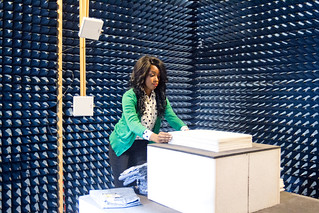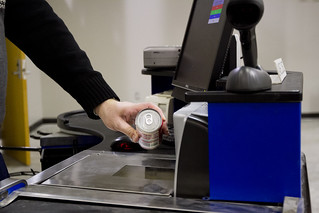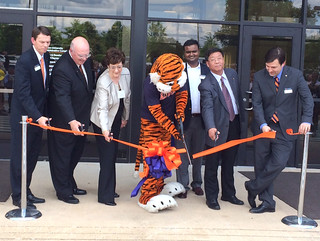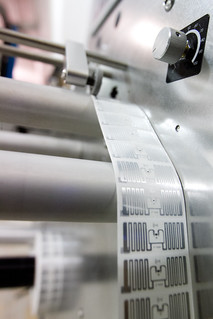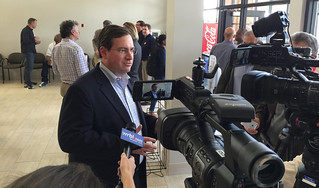Auburn University RFID Lab engages industry leaders
Article body
When Justin Patton's son was born recently, a nurse applied small white plastic bands to mother and child. Enabled by radio frequency identification technology, or RFID, the band enables a hospital to monitor the location and ensure the safety of newborns.
"That just goes to show that RFID technology is with us from cradle to grave," said Patton, director of Auburn University's RFID Lab.
On Wednesday, Patton celebrated the grand opening of a research facility devoted to his other love, the exploration of how RFID technology can be utilized to benefit retailers, manufacturers and others engaged in the supply chain. RFID involves the use of a wireless system to transmit data from tags on products to a receiver for the purpose of identifying and tracking them through the supply chain. The computer chip "tags" are smaller than a grain of sand.
More than 200 industry representatives, including executives from Fortune 100 and 500 companies, toured the Auburn University RFID Lab during its grand opening ceremony. Amazon, Avery Dennison, Checkpoint Systems, GS1 US, NXP Semiconductors, Saks Fifth Avenue, Smartrac, Target, Tyco, VF Corp., View Technologies and Zebra Technologies are among the industry leaders sponsoring RFID Lab research.
"As the RFID industry expands, it's important to have as many users engaged in the lab as possible as lessons from one industry often hold true for others," Patton said.
Patton said having corporate partners engaged with the lab enables Auburn University faculty and students to "focus on the research questions that are most crucial to many different users, and add the academic validation that helps bring maturity to the evolving market."
Beyond retail, Patton said the potential applications for RFID technology extend to such areas as food and pharmaceutical safety. Disney uses the technology to enable theme park attendees to pay hotel bills and purchase souvenirs with the scan of a wrist band. The NFL began using RFID technology last season to track player speeds, distance coverage and on-field movement patterns.
Located in a former supermarket, the 13,000-square foot RFID Lab offers simulated retail, grocery and convenience store space, as well as warehouse and distribution center environments. The Auburn University RFID Lab established the first RFID "tagged item certification program" to assist retail product manufacturers.
The lab draws on the expertise of faculty in Auburn University's Raymond J. Harbert College of Business, Samuel Ginn College of Engineering, College of Human Sciences and College of Agriculture. In moving to Auburn University in 2014, the lab was reunited with its founder, Harbert College of Business Dean Bill Hardgrave. Hardgrave helped launch the lab at the University of Arkansas in 2005.
"Great companies are now here at Auburn University, and many of those for the very first time," Hardgrave said. "They're working with our faculty, they're hiring our students."
Auburn University Provost Timothy Boosinger said that ongoing work exemplifies the university's land-grant mission and willingness to pursue new research lines of inquiry.
"Discoveries made by the RFID Lab will position Auburn as a leader in distributive technologies and will change the landscape of consumer-based industries," he said. "The RFID center will examine the drivers and outcomes of consumer behavior, managerial practices and organizational dynamics to show how they influence all of us."
Related Media
Media interested in this story can contact Communications Director Preston Sparks at (334) 844-9999 or preston.sparks@auburn.edu.
Auburn University is a nationally ranked land grant institution recognized for its commitment to world-class scholarship, interdisciplinary research with an elite, top-tier Carnegie R1 classification, life-changing outreach with Carnegie’s Community Engagement designation and an undergraduate education experience second to none. Auburn is home to more than 30,000 students, and its faculty and research partners collaborate to develop and deliver meaningful scholarship, science and technology-based advancements that meet pressing regional, national and global needs. Auburn’s commitment to active student engagement, professional success and public/private partnership drives a growing reputation for outreach and extension that delivers broad economic, health and societal impact.




